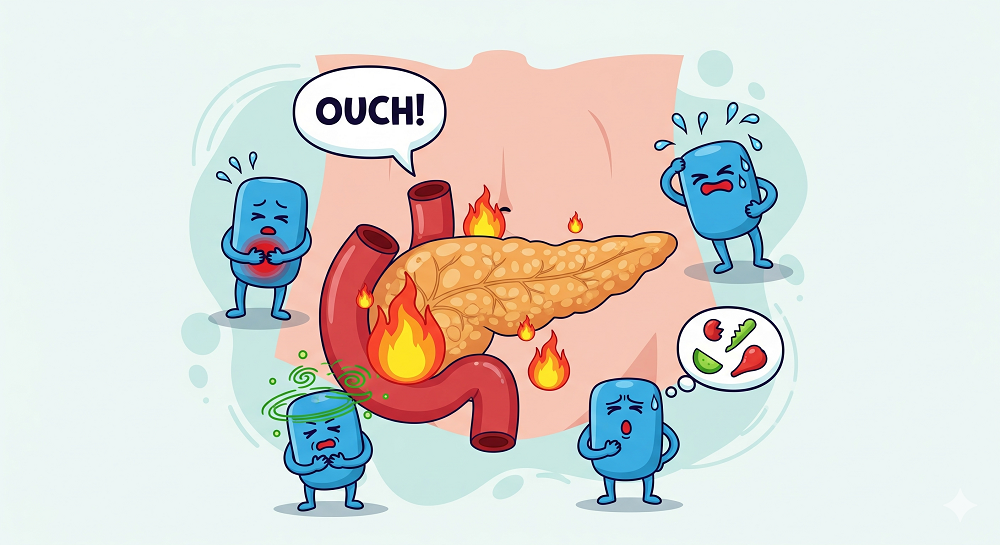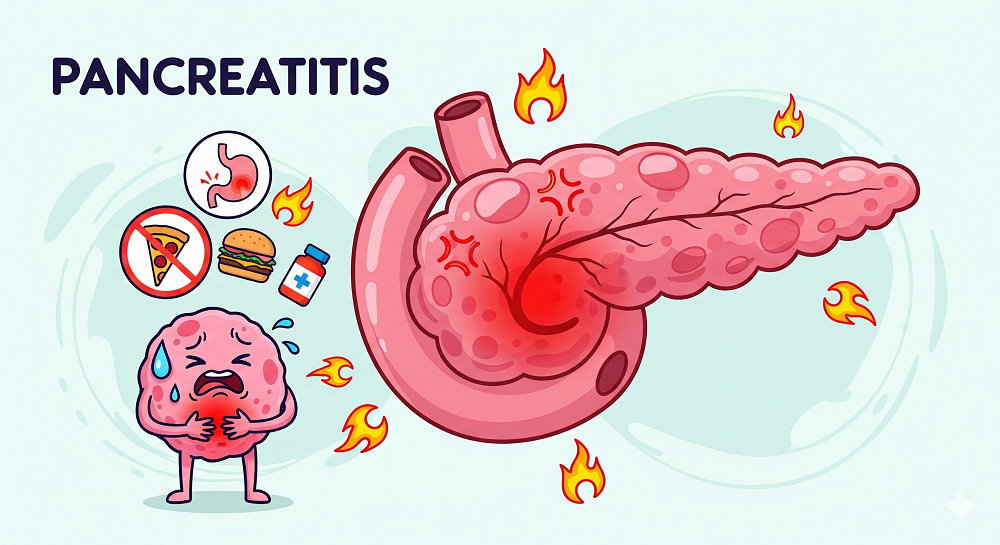
What is Pancreatitis?
Pancreatitis can be either acute or chronic.
- Acute Pancreatitis: This is a sudden inflammation of the pancreas that occurs over a short period. It can be a very serious, life-threatening condition, but most cases are mild and resolve within a few days of treatment.
- Chronic Pancreatitis: This is a long-term condition that involves persistent inflammation. Over time, this inflammation can cause irreversible damage to the pancreas, leading to a decline in its function. This can result in digestive issues, weight loss, and even diabetes.
Pancreatitis Symptoms: Recognizing the Signs
The symptoms of pancreatitis can vary depending on whether the condition is acute or chronic. However, the most common and prominent symptom is severe abdominal pain.
Symptoms of Acute Pancreatitis:
- Upper Abdominal Pain: This is the hallmark symptom, often described as a sharp, boring pain in the upper abdomen that may radiate to the back.
- Pain that Worsens After Eating: The pain typically intensifies after meals, as the pancreas is stimulated to produce more digestive enzymes.
- Nausea and Vomiting: Many patients experience nausea and frequent vomiting.
- Fever and Rapid Pulse: These are common signs of inflammation and the body’s response to the condition.
- Abdominal Tenderness: The abdomen may feel tender to the touch.
Symptoms of Chronic Pancreatitis:
- Persistent Upper Abdominal Pain: The pain may be constant or come and go in waves. It can be debilitating and significantly impact quality of life.
- Unintended Weight Loss: Due to a lack of proper digestion, the body cannot absorb nutrients, leading to weight loss.
- Oily, Foul-Smelling Stools (Steatorrhea): This is a key indicator of fat malabsorption.
- Diarrhea: Chronic diarrhea can be a symptom of malabsorption.
- Diabetes: As the pancreas’s ability to produce insulin diminishes, patients may develop diabetes.
Causes of Pancreatitis

Pancreatitis occurs when the digestive enzymes are activated while still inside the pancreas, causing them to “digest” the pancreatic tissue itself. The causes can be varied and, in some cases, unknown.
- Gallstones: This is one of the most common causes of acute pancreatitis. Gallstones can block the bile duct, which also serves the pancreas, causing a backup of digestive juices and leading to inflammation.
- Alcohol Abuse: Excessive alcohol consumption is a major cause of both acute and chronic pancreatitis. The exact mechanism is not fully understood, but it is believed that alcohol triggers the premature activation of pancreatic enzymes.
- High Triglycerides: Extremely high levels of triglycerides (a type of fat in the blood) can also cause pancreatitis.
- Certain Medications: Some drugs, including certain diuretics and antibiotics, have been linked to pancreatitis.
- Genetic Factors: Conditions like cystic fibrosis can increase the risk of developing pancreatitis.
- Autoimmune Diseases: In some cases, the body’s immune system mistakenly attacks the pancreas, causing inflammation.
- Trauma or Surgery: Injury to the abdomen or surgery near the pancreas can lead to pancreatitis.
Homeopathic Treatment for Pancreatitis: A Gentle Path to Healing
While conventional treatment for pancreatitis often involves hospitalization, intravenous fluids, pain management, and, in severe cases, surgery, homeopathy offers a complementary and, in many instances, standalone treatment option. The core principle of homeopathy is to treat the individual, not just the disease. Homeopathic medicines are highly diluted, natural substances that stimulate the body’s inherent healing capabilities.
At Aarogya Clinic, the homeopathic approach to pancreatitis is a meticulously crafted, multi-faceted strategy.
- Individualized Case Taking
The first and most crucial step is a detailed and comprehensive case history. The homeopathic physician at Aarogya Clinic will not only inquire about the physical symptoms but also delve into the patient’s emotional state, lifestyle, dietary habits, and any co-existing health conditions. This holistic understanding allows for the selection of a constitutional remedy that matches the unique symptom picture of the patient.
- Symptom-Specific Remedies
Based on the individual’s symptoms, the homeopath will prescribe remedies that have a proven affinity for the pancreas. Some of the commonly used homeopathic remedies for pancreatitis include:
- Phosphorus: Often indicated for pancreatitis with a burning pain that is better with cold drinks and a great thirst for cold water. The pain may be worse in the evening and at night.
- Iris versicolor: This remedy is particularly useful for pain that is accompanied by sour, burning vomiting and a feeling of nausea. The pain may be very severe and seem to radiate to different areas.
- Belladonna: Prescribed for cases with sudden, violent, and intense pain, often with fever and a flushed face.
- Lycopodium: A good remedy for chronic pancreatitis, especially when symptoms include bloating, gas, and a feeling of fullness after eating only a small amount. The pain may be worse in the late afternoon.
- Spongia Tosta: Useful for cases where the pain is accompanied by a sense of suffocation or a feeling of a lump in the throat.
- Addressing the Underlying Cause
Homeopathy aims to treat the root cause of the problem. For instance, if the pancreatitis is a result of gallstones, the homeopathic remedies will not only address the inflammation but also work to dissolve the stones and prevent their formation. Similarly, if the cause is lifestyle-related, the homeopathic treatment will be accompanied by specific dietary and lifestyle advice to support the body’s recovery.
- Supporting Long-Term Pancreatic Health
Beyond the acute phase, homeopathy at Aarogya Clinic focuses on preventing the recurrence of pancreatitis. The constitutional remedies work to strengthen the body’s overall vitality and resistance, making it less susceptible to inflammation. This long-term approach is what sets homeopathy apart and offers a lasting solution rather than a temporary fix.


